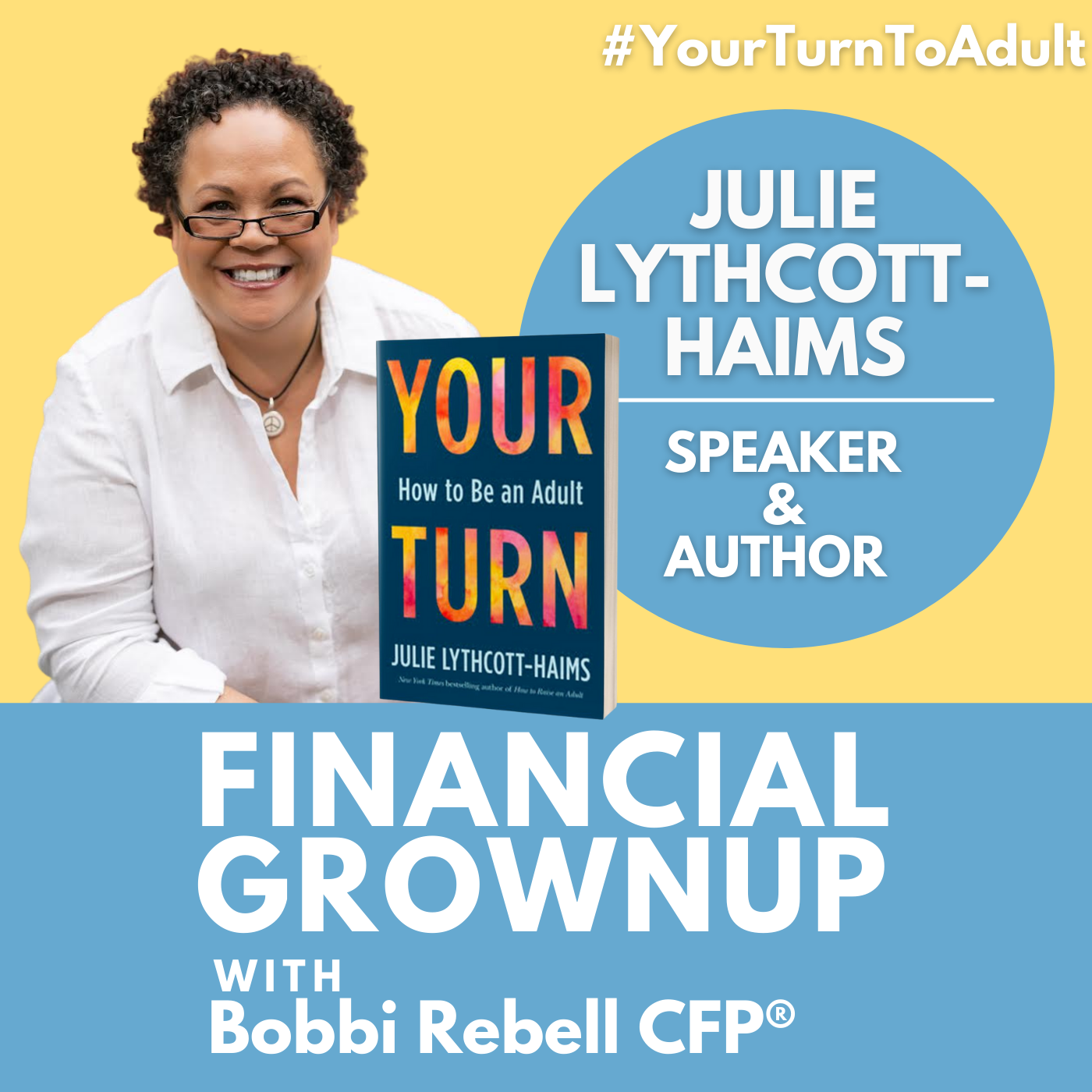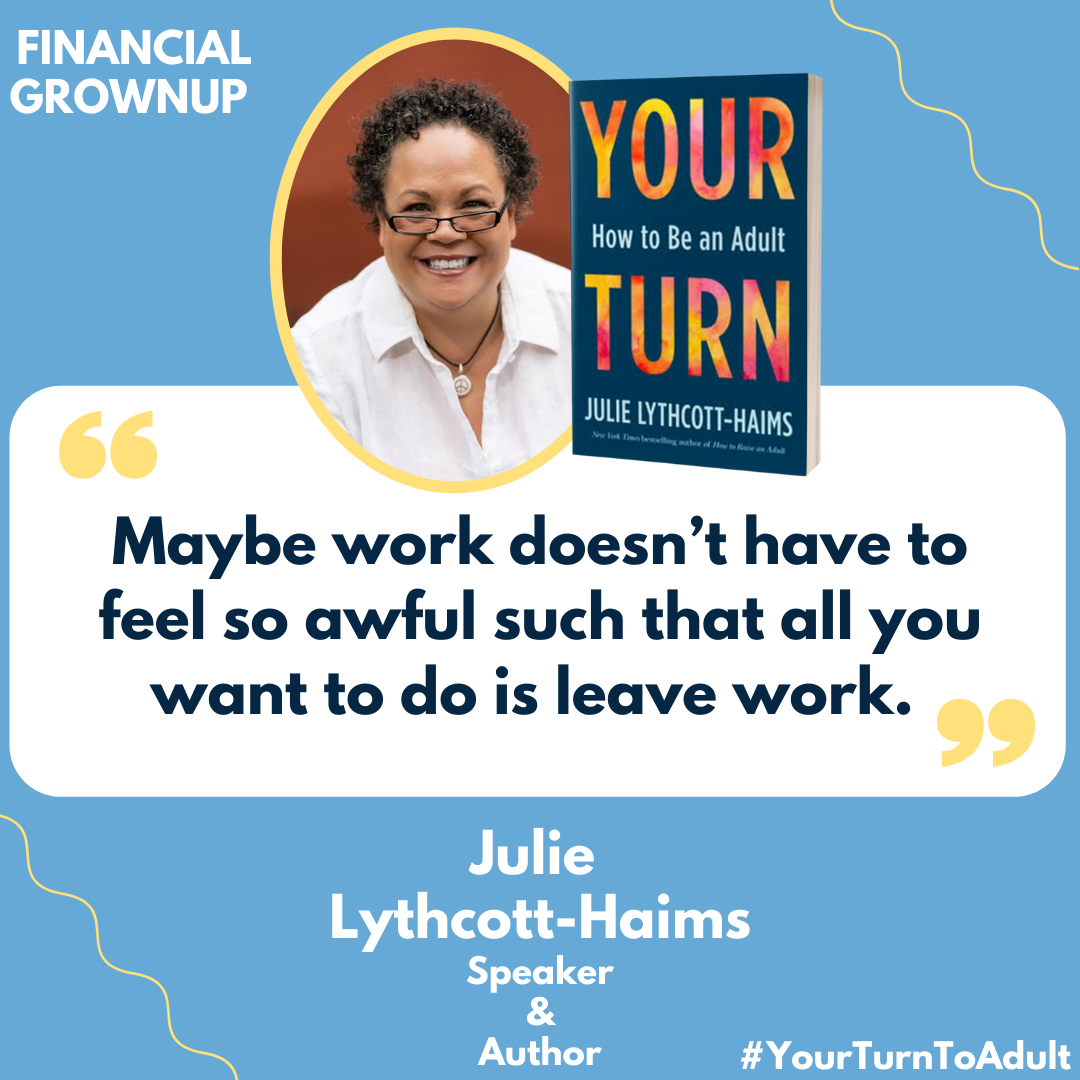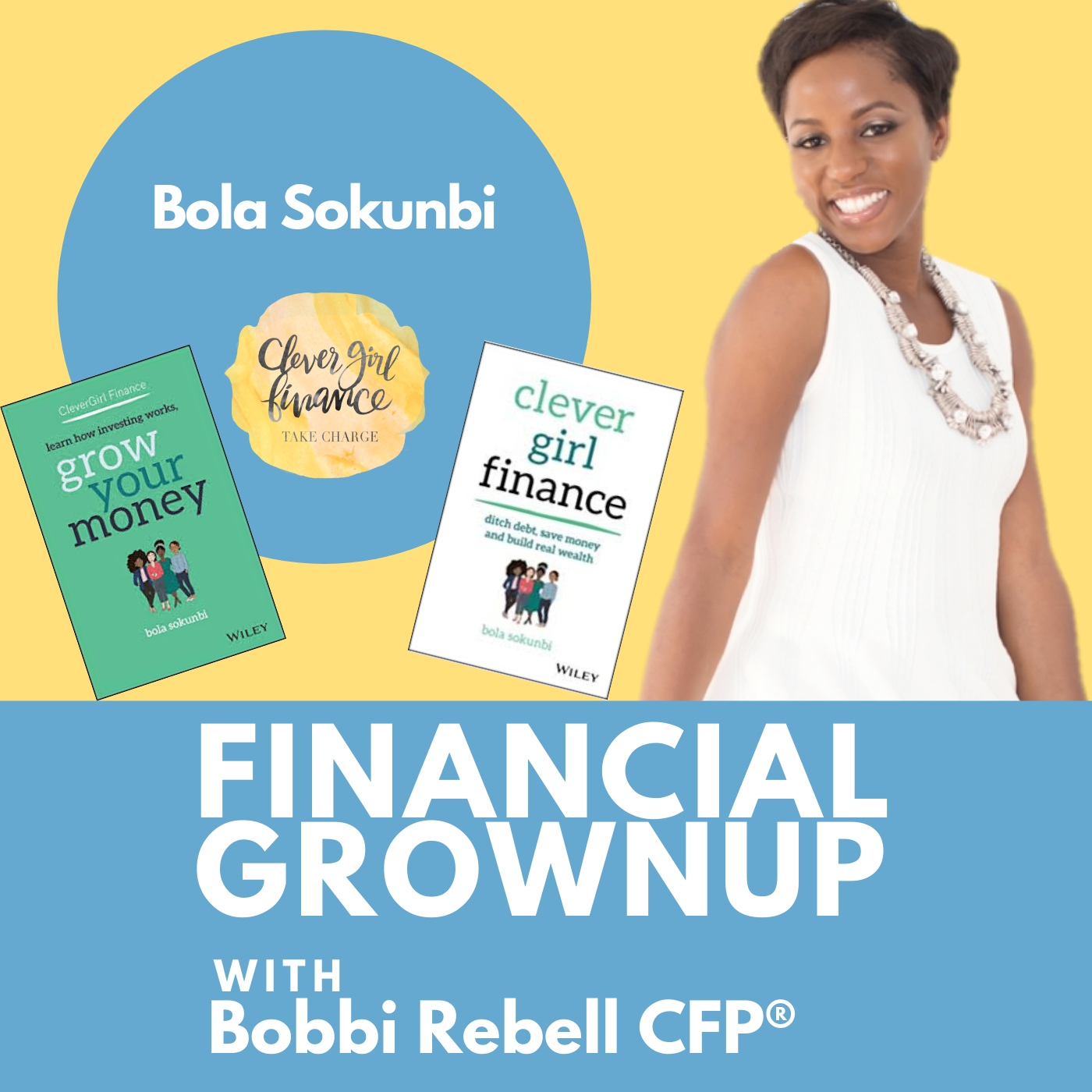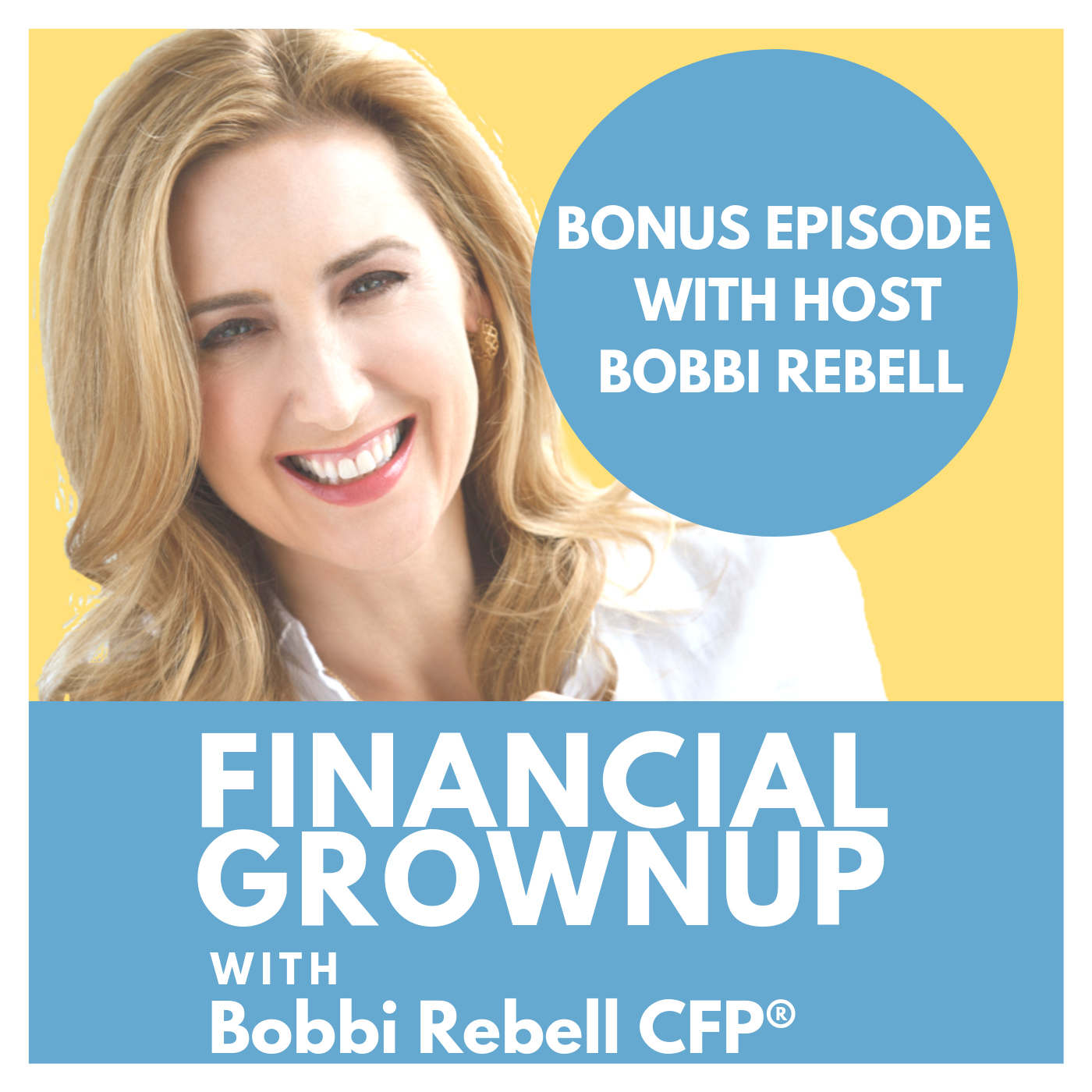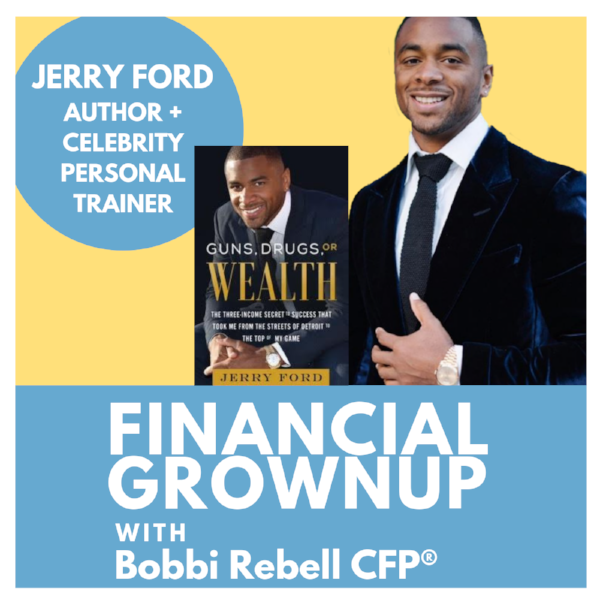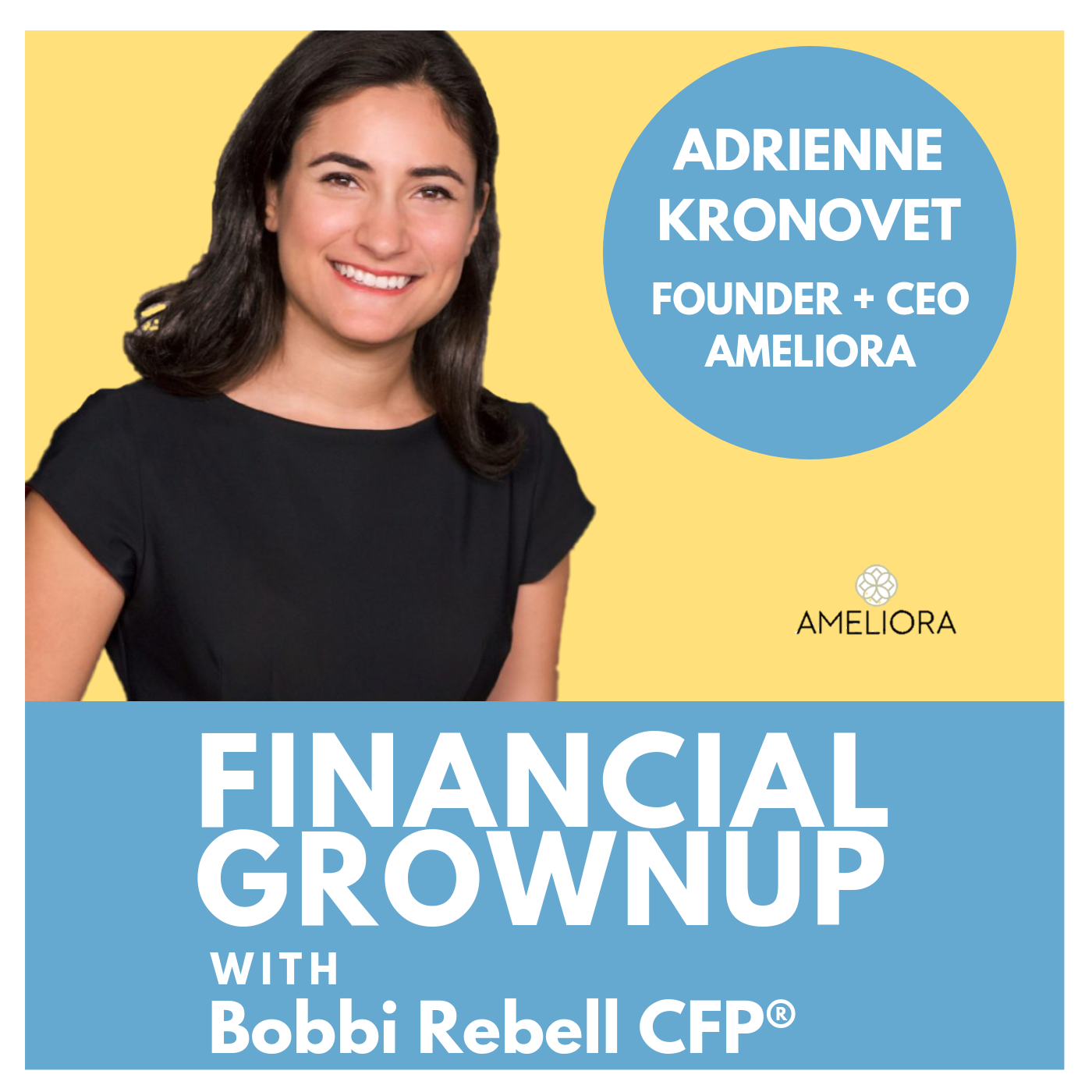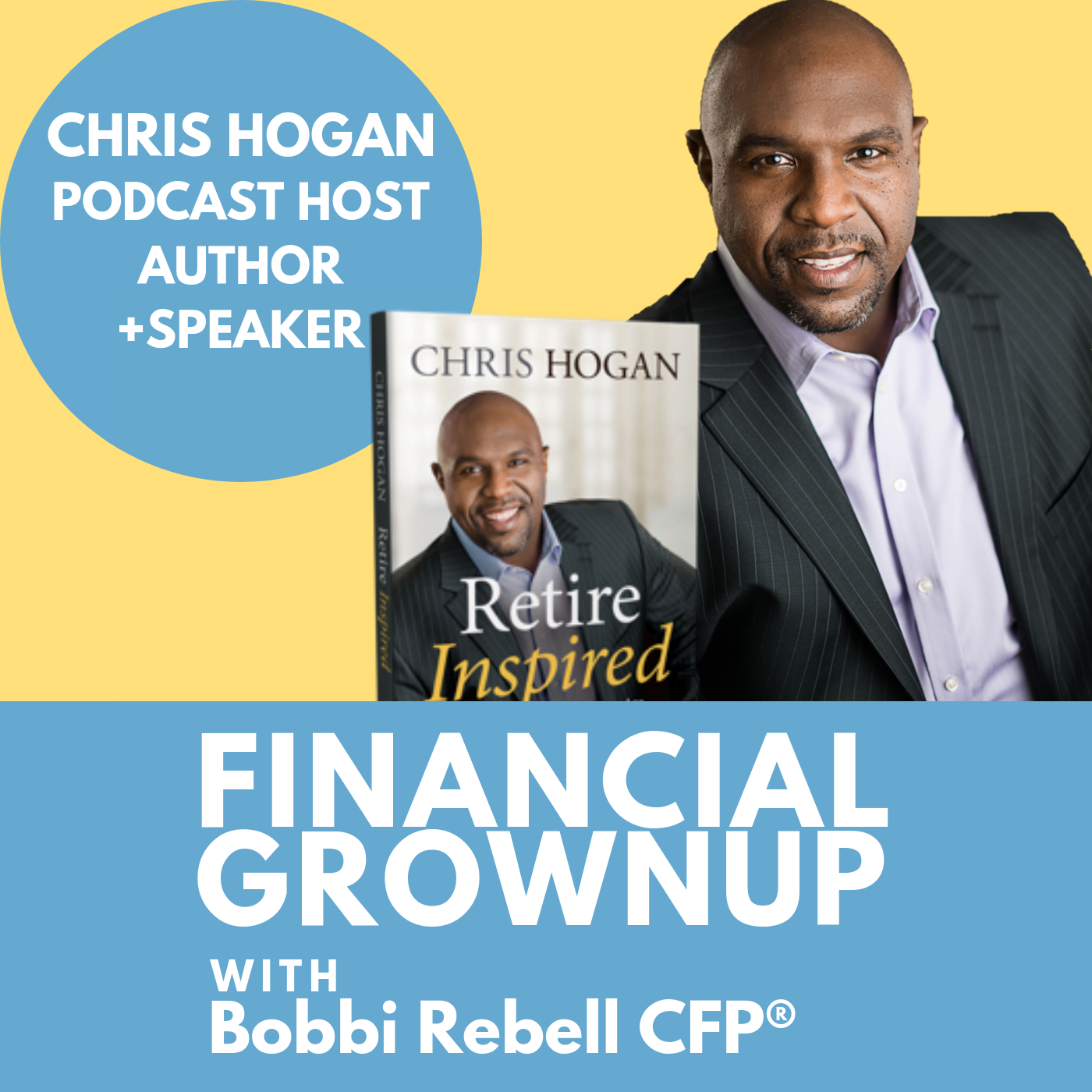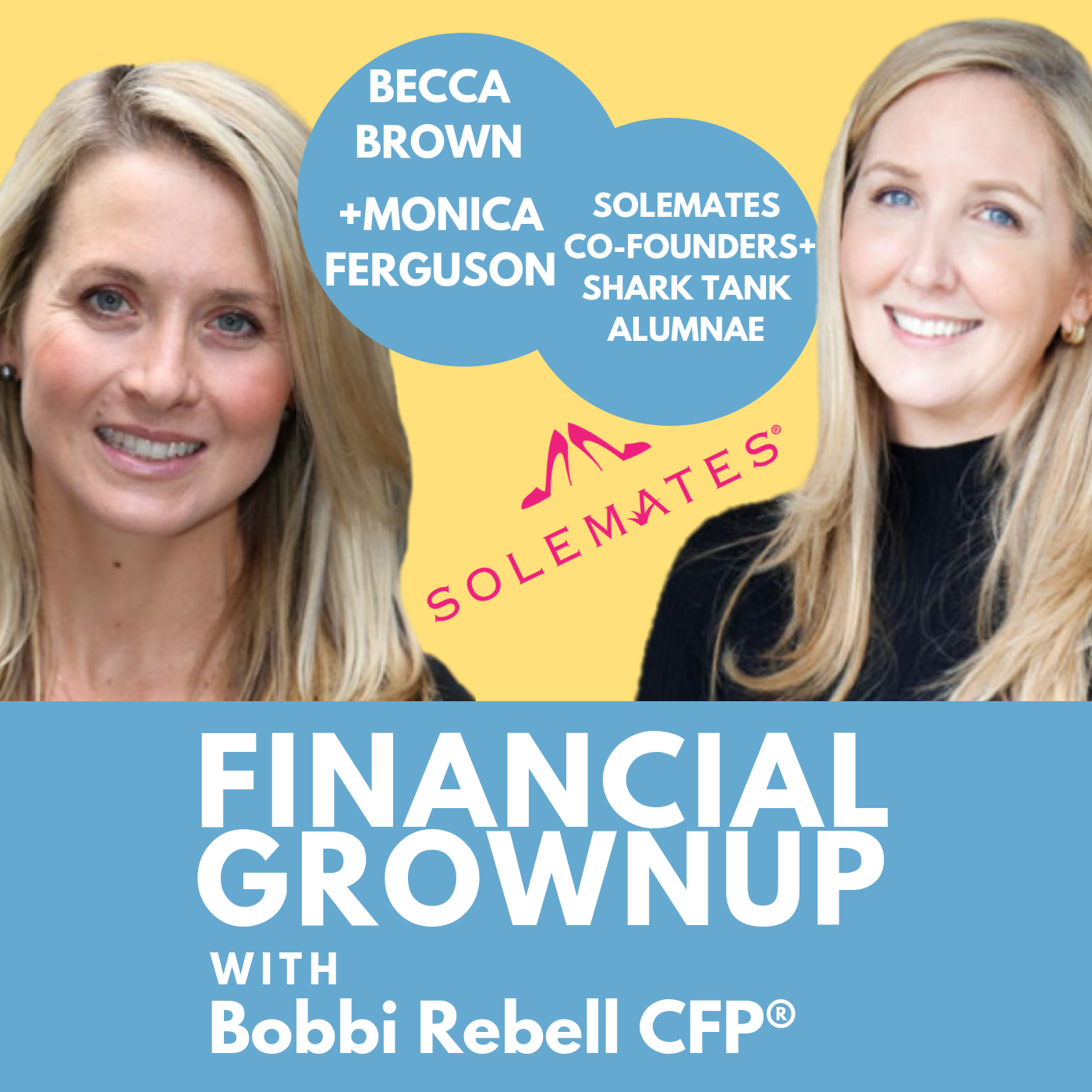Follow Bobbi!
Did you enjoy the show? We would love your support!
Leave a review on Apple Podcasts or wherever you listen to podcasts. We love reading what our listeners think of the show!
Subscribe to the podcast, so you never miss an episode.
Share the podcast with your family, friends, and co-workers.
Tag me on Instagram @bobbirebell1 and you’ll automatically be entered to win books by our favorite guests and merch from our Grownup Gear shop.
Full Transcript:
Bobbi Rebell:
It is officially spring, and that means graduation season is on. We here at the Financial Grownup Podcast have created some new super fun gifts just for that in our grownupgear.com merch store. We have adorable hats, totes, mugs, pillows, tees, and the seriously most cozy and comfortable sweatshirts, all on grownupgear.com and all at affordable prices. Grownup Gear also makes great gifts for Mother's Day, Father's Day, engagements, bachelor/bachelorette parties, birthdays, and of course, just for fun to treat yourself. Use code GRADUATION for a 15% discount, and thank you in advance for your orders. Buying from our small business helps to support this free podcast, and we truly appreciate your support.
Rachel Rodgers :
We did a 10K in 10 Days challenge with 350 of our clients. The average was like $6,700 per person, and they, as a group, made $2.4 million in 10 days.
Bobbi Rebell:
You're listening to Money Tips for Financial Grownups, with me, certified financial planner, Bobbi Rebell, author of How to be a Financial Grownup. And you know what? When it comes to money, being a grown up is hard, but together, we've got this.
Bobbi Rebell:
Yes, my friends, $10,000 in 10 days, do you dare take the challenge? You want to hear about it though, right? Rachel Rodgers is back and the perfect guest for our newly updated format here on Money Tips for Financial Grownups. If you missed the bonus episode, it should be just before this one in your feed, but in short, we're streamlining the show to focus more on money tips to help us all be our best financial grownups. I lost count of all the incredible money tips that Rachel shares in our interview, but you're going to hear ... sound every time she drops one.
Bobbi Rebell:
Rachel, who is the CEO of HelloSeven and runs the Rodgers' Ranch, which you're going to hear about in our interview, has a new book out called We Should All be Millionaires. I read it cover to cover in one sitting and you should too, then you should also go back and make note of all the gems in the book. But first, let's get some extra money tips in our interview. Here is Rachel Rodgers.
Bobbi Rebell:
Rachel Rodgers, you're a financial grownup. Welcome to the podcast again, welcome back.
Rachel Rodgers :
Yay, I'm so glad to be back. I'm excited.
Bobbi Rebell:
Well, we're celebrating because your book, We Should All be Billionaires: A Woman's Guide to Earning More, Building Wealth, and Gaining Economic Power, is released today, the day that this episode is coming out. Tell us high level about the book and what we can expect.
Rachel Rodgers :
Yes. Well, you can expect some tough love and you can expect a guide to becoming a millionaire, making a million dollars. I think we need that. We shoot for six figures and it's not enough, I don't know if you've noticed. You probably have, because you're a financial grownup.
Bobbi Rebell:
And I live in New York City.
Rachel Rodgers :
Exactly, but I want women to be shooting for seven figures so that we can really make a massive impact. The reality is that 2% of women entrepreneurs ever hit the seven-figure mark, and when it comes to the world's billionaires, very, very few of them are women. I think we need to understand how to earn more, and that's what this book is about. It's not about what to put in your 401k or how to invest, what to do with your money on the backend. No, it's about how to get more of it in the first place.
Bobbi Rebell:
You challenge your clients to come up with a way to make $10,000 in 10 days. Let's just start with the results, and then tell me some of the ways that you could make $10,000 in 10 days.
Rachel Rodgers :
We did a 10K in 10 Days challenge with 350 of our clients, and they, as a group, made $2.4 million in 10 days.
Bobbi Rebell:
What was the average?
Rachel Rodgers :
The average was like $6,700 per person, approximately.
Bobbi Rebell:
Which is incredible.
Rachel Rodgers :
I mean, incredible, right? To me, it's not about the money. It's about the fact that what I'm trying to prove and what I want women to be able to prove to themselves is that you can earn as much as you want, whenever you want. You have the ability to generate cash whenever you need to. I think we have a money problem come up and we're like, "I don't know what I'm going to do. Let me start cutting things and slashing things. Let me start shrinking my life," and I'm like, "I do the opposite." If something comes up and I want to spend money on something, I'm like, "Okay, well, let me think about what are my different ways of earning more and which one am I going to choose? Okay, great. I'm going to choose that one, let me put it out there," and then I earn that money in 30 days or less and then I go do that thing I wanted to do.
Bobbi Rebell:
What are some of the best ways people came up with to earn money?
Rachel Rodgers :
Oh, it was amazing. There were people having yard sales, people were just reaching out to past clients who owed them money and they just hadn't reached out to them and said, "Hey, you owe me money. Hey, you hadn't paid your invoice, can you go ahead and take care of that?" They made all this money from clients that were like six months late, just because they weren't following up. I'm like, "Honey, we need to focus on our money and not let all of those dollars trickle out of our hands." That's what I see happening with women as a whole, and so I'm asking us to hold ourselves accountable to really pay attention to our money.
Rachel Rodgers :
That was some of the things that they did. They launched new programs, they created products. They had ideas for all these different ways that they could make money or they thought like, "Oh, one day maybe I'll do X," and I'm like, "I challenge you to go do X right now," and they would do it. They would launch a new program or launch a product and put it out there. They didn't even have to create the product or the program yet, they could just say, "Hey, this is coming. Would you like one? If you purchase it early, here's what happens. You have 10 days to say, yes, you want it," they buy it and then you have a little bit of time to go create the thing and deliver it.
Bobbi Rebell:
And it's also a proven idea. One of my favorite parts of the book, you say you have three ways that women make bad money decisions. What are the three ways that women make bad money decisions?
Rachel Rodgers :
Well, we have this thing where we want to be liked, it's like every human wants to be liked, this is not unique to women, but our culture has created this situation where women think they need to be nice and they need to be liked by all. Let me tell you something, that is a losing game. That desire to be liked really kills your ability to generate more money. I think, we think like, "Oh, if I make a bunch of money, people are not going to like me." You know what? People already don't like you, so who cares? Might as well make some money.
Bobbi Rebell:
Absolutely. Okay, number two, what was the second thing?
Rachel Rodgers :
Environment. We're in this broke (beep) environment. We have (beep) bras. I literally just bought 12 new bras because we've been in a pandemic and every bra has a busted strap, the wire is broken. I was like, "Honey, get your life together." It was just things like that. One of my clients used to have a cabinet in her kitchen that would not open all the way, and because of that, she had a small little kitchen and so it was all shoved into the other cabinets. Every time she opened her cabinets, all this (beep) falling out. She was just like, "This drives me nuts literally all day, every day," every time she's making coffee, every time she's preparing a meal.
Rachel Rodgers :
It's just little things like that, where we have shabby conditions around us that make us feel shabby inside. When you wake up and your environment tells you, "You know what? You must be a boss because look at this environment that you're in," guess what? You're going to go out there and you're going to make million-dollar decisions all day, every day. It really shifts your energy when you are in an environment that makes you feel really good.
Bobbi Rebell:
And then the third one has to do with who we surround ourselves with, right?
Rachel Rodgers :
Exactly. Are you surrounding yourself with people who make broke (beep) decisions all day? Is your best girlfriend, Brenda, calling you to complain about her job every day, but never does anything to go get a better job or talk to her boss about it or deal with her situation? Or are you surrounded by people who when you say, "Hey, I'm thinking about doing this exciting thing. Hey, I'm thinking about buying a house. Hey, I'm thinking about making this money move," they're like, "Ooh, I wouldn't do that," and discouraging you and being very negative about it and making you feel bad about being ambitious? When you have those kinds of people around you all day, trust me, it is affecting your ability to make million-dollar decisions.
Rachel Rodgers :
This is literally nonstop. This is exactly how it works, and there's science to back it up. Harvard studies, where it shows that the people that you spend the most time with, 95% of your success or failure in whatever it is that you are trying to accomplish comes from the people you surround yourself with on a daily basis. If you are surrounding yourself with naysayers, people who are negative, people who are not ambitious at all, people who are discouraging, you are going to be discouraged and you're likely not going to make the moves that you want to be making.
Bobbi Rebell:
Another money tip in the book that I love has to do with flipping just one word. Tell us about that.
Rachel Rodgers :
Yes. Okay, a lot of times we say, "Well, I really want to upgrade my home, but I don't have enough money." One of the sections of the book, what we talk about is can we flip that but to an and? Can we say instead of, "I want to do this thing, but I can't afford it," what if you said, "I want to do this thing and I don't currently have the money." Cool, now that opens up possibilities. It makes you feel like, "Oh, okay. These are the facts of the case. I want to do this thing and I don't have the money right now, but what could I do to change the situation?" I could potentially change it. It creates opportunity. It opens it up, it expands the possibilities. Whereas when you say, "But," it's kind of like it closes the door on that being a possibility, it closes the door on that opportunity. I encourage you to be and people instead of but people.
Rachel Rodgers :
This goes to the peer group. Are you surrounded by people who can say, "Yes, that's true, and what could you do differently? Let's brainstorm some opportunities." Imagine if we had friends who would brainstorm business opportunities, money-making opportunities, networking opportunities with us, instead of talking about everything that's wrong with the world and just complaining all the time and commiserating. We could do that too, but let's make sure that we are also being expansive. If you change your but to and, that might open up some creativity for you to come up with solutions to the financial problems that come up.
Bobbi Rebell:
Changing the way that you frame how you see things, so important. You also talk about taking certain tests to figure out basically where your talent is, where you're most likely to be the most successful.
Rachel Rodgers :
One of the things that we recommend is that we do an assessment, a skills assessment, to see what skills have I acquired over the years, what are my natural talents and gifts and strengths, what am I naturally good at, what do people come to me all the time to ask me for, where you can start to really hone in on the way that you add value in the world and then how can you capitalize on that skill, how can you start charging for that service, or how can you create a product based on that skillset that can increase your earning potential.
Bobbi Rebell:
And there are specific tests you recommend.
Rachel Rodgers :
Yes, exactly. You can take StrengthsFinders, Kolbe, DiSC. There's also a great book called The Big Leap by Gay Hendricks. Each one of these will help you assess for yourself where your natural talents and skills lie, and so you can figure out where is my money-making potential.
Bobbi Rebell:
You were waiting for a client's check.
Rachel Rodgers :
Yes.
Bobbi Rebell:
And you needed that money. It's very relatable in the last year, because we all learned how important having that cash cushion, whether you label it as an emergency fund or just savings, whatever it may be, you were in a precarious position waiting on money to come in. Tell us what you needed the money for, what was going on, and how it was resolved.
Rachel Rodgers :
Yes. This was years ago, I was probably two years into building my business. I was pregnant with my son, my daughter was one years old. I was trying to put her in daycare. I was working from home, my husband was in school at the time. My child had been home with us for a full year, there was zero childcare. My child was with her father or me or both of us for the whole first year of her life. I'm trying to grow a law practice, so I needed childcare, and searched for the right childcare, found a great place and her spot came up on the wait list. I'm like, "Great." Now, I'm waiting for this corporate check to come from a client. This was one of my first corporate clients and it was a big check for $5,000, which was the most money that I had ever received at one time in my life at the time.
Rachel Rodgers :
I'm waiting for months for this check to come, because we all know corporations, sometimes it's like net 30. I mean, they just pay you when they feel like it, basically. Three, four months later, finally the check shows up, I go to the bank to deposit, I'm like, "Thank God, I'm going to deposit this check and then immediately write a check for the daycare and go drop that off so that I can hold her spot," because it was like the last day to reserve her spot. I get to the bank, I deposit it, I'm all giddy and excited. I mean, I'm in my sweats, looking like crap, but who cares, I got money so I'm happy. I go to deposit it and the bank teller says, "Great, that'll be a two-week hold," and I'm like, "Pardon me? What?" I'm whispering to her because I don't want the other people in the bank to hear me and I'm like, "Is there any way you can make that available like today?" and she's like, "Nope, I can't because it's an out-of-state check."
Rachel Rodgers :
She sent me to go talk to the branch manager. I go talk to the branch manager, who's an older white guy. Here I am in my sweats looking like a broke (beep) college student and not a trustworthy professional. I go and talk to him and tell him I need the money right away. My face is getting red and I'm just absolutely mortified to be an attorney who has to go beg the branch manager to make her money available right away. It was a good wake up call. I was watching the branch manager and another banker looking at their monitor, I could tell they're scrolling through my account, looking at all my purchases. I'm sitting there and I'm feeling the hot tears come, my face is all red. As I sat there, I just had this moment where I was like, "Never again. This is my fault that I'm here right now and it will never, ever happen again."
Rachel Rodgers :
Luckily, they did release the check, I was able to put my daughter in childcare. That year I took that business from $60,000 a year to $300,000, so 5X'd my revenue, because I got focused because I realized the money was on me. Somebody else isn't going to make that money for me, it's not going to manifest out of thin air, and it's nobody's fault necessarily. Yes, there are systemic things at play. There is racism and sexism at play for sure, and at the same time, I also have a choice in the matter and there's also decisions that I'm making on a daily basis. I held myself to being a financial grownup, and that year, I really grew up and made a lot more money.
Bobbi Rebell:
Just one of the many, many incredible and inspiring stories in your new book. Tell us, we know the book is available everywhere, what else should people be looking out for from you? I know you have a course associated with the book and a lot more going on at the Rodgers' Ranch and so on. Tell us.
Rachel Rodgers :
Yes. Lord, I seem to have way too much going on. We have a podcast called the HelloSeven Podcast. We're always interviewing women, definitely women of color, who are making seven figures or more, because again, I like to provide my clients with evidence.
Bobbi Rebell:
And the Rodgers' Ranch, what's going on there?
Rachel Rodgers :
Yes, we have been fixing it up. It's so funny, my children are right outside my window. My little cottage is right next to the arena where we do horse training and lessons and stuff. My kids are out there right now, riding horses. Yeah, we're crazy up in here. We've also been renovating our retreat house. We're going to be opening up to be able to offer our retreat house up to people who want to come and have a little equestrian getaway here in North Carolina, in the next couple of weeks, so that's really exciting.
Bobbi Rebell:
And you have social handles for all these things, right?
Rachel Rodgers :
Yes. We are @therodgersranch, Rodgers with a D, on Instagram. Then my personal Instagram is @rachrodgersesq, and you can follow my company, HelloSeven, @hello7co.
Bobbi Rebell:
Thank you so much for coming back to the show.
Rachel Rodgers :
Thank you for having me. I love talking about money.
Bobbi Rebell:
Okay, my friends, let's review some of the key money tips that Rachel gave us. First of all, aim high. Rachel is all about seven figures, not six. Having high goals is a win-win. If you reach it, you win, but if you get closer than you would have with a lower goal, you also are better off and you still have more room to grow, win. One of the easiest ways to make money is to collect the money that you are owed receivables matter, get them settled. Sell before you create, that way you prove the concept and you have built in pre-orders when you do launch. Just be careful to manage timeline expectations for when customers will get the product.
Bobbi Rebell:
Get over getting everyone to like you and choose who you spend your time with very carefully. Be a friend, be a business colleague, do not be a therapist, unless of course you are a therapist. Make the effort to create a work environment where you will be your most productive. People are shocked that I wrote most of my book, How to Be a Financial Grownup, at a big ugly Formica table under bright lights at the Whole Foods across the street from my apartment. But you know what? There were no distractions and there was great wifi, it worked. Try to experiment a bit and find what works for you. And take a skills assessment test. We'll have the links to the ones Rachel suggested in the show notes.
Bobbi Rebell:
Friends, there is also a companion course to Rachel's book. You can find out more on her website, which we will also have linked in the show notes. Let me know how you guys liked the updated format. DM me on Instagram @bobbirebell1 and get more money tips by going to my website, BobbiRebell.com, and signing up for our now weekly Money Tips newsletter. Big thanks to Rachel Rodgers for coming back and sharing her money tips for financial grownups.
Bobbi Rebell:
The Financial Grownup Podcast is a production of BRK Media. The podcast is hosted by me, Bobbi Rebell, but the real magic happens behind the scenes with our team. Steve Stewart is our editor and producer and Amanda Saven is our talent coordinator and content creators, so yeah, that means she does the show notes you can get for every show right on our website and all the fantastic graphics that you can see on our social media channels. Our mission here at Financial Grownup is to help you be at your financial best in every stage of life. This year, we want to help you get there by giving away some of our favorite money books. To get yours, make sure you are on the grownup list. Go to BobbiRebell.com to sign up for free. While you're there, please check out our Grownup Gear shop and help support the show by buying something to express your commitment to being a financial grownup.
Bobbi Rebell:
Stay in touch on Instagram @bobbirebell1 and on Twitter @bobbirebell. You can email us at hello@financialgrownup.com, and if you enjoyed the show, please tell a friend and maybe leave a review on Apple Podcasts, it only takes a couple minutes. Join us next time for more stories to help you live your best grown-up life.
Follow Rachel!
Follow Bobbi!
Did you enjoy the show? We would love your support!
Leave a review on Apple Podcasts or wherever you listen to podcasts. We love reading what our listeners think of the show!
Subscribe to the podcast, so you never miss an episode.
Share the podcast with your family, friends, and co-workers.
Tag me on Instagram @bobbirebell1 and you’ll automatically be entered to win books by our favorite guests and merch from our Grownup Gear shop.













